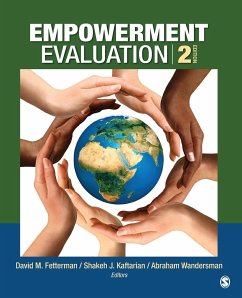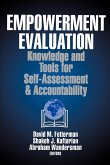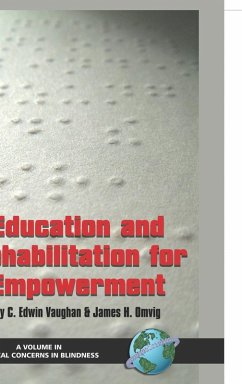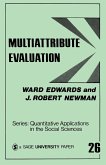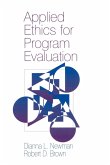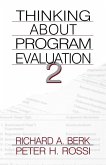David M. Fetterman, Shakeh J. Kaftarian, Abraham Wandersman
Empowerment Evaluation
Knowledge and Tools for Self-Assessment, Evaluation Capacity Building, and Accountability
David M. Fetterman, Shakeh J. Kaftarian, Abraham Wandersman
Empowerment Evaluation
Knowledge and Tools for Self-Assessment, Evaluation Capacity Building, and Accountability
- Broschiertes Buch
- Merkliste
- Auf die Merkliste
- Bewerten Bewerten
- Teilen
- Produkt teilen
- Produkterinnerung
- Produkterinnerung
This Second Edition celebrates 21 years of the practice of empowerment evaluation, a term first coined by David Fetterman during his presidential address for the American Evaluation Association. Since
Andere Kunden interessierten sich auch für
![Empowerment Evaluation Empowerment Evaluation]() David M. FettermanEmpowerment Evaluation60,99 €
David M. FettermanEmpowerment Evaluation60,99 €![Education and Rehabilitation for Empowerment (Hc) Education and Rehabilitation for Empowerment (Hc)]() C. Edwin VaughanEducation and Rehabilitation for Empowerment (Hc)106,99 €
C. Edwin VaughanEducation and Rehabilitation for Empowerment (Hc)106,99 €![Multiattribute Evaluation Multiattribute Evaluation]() Ward EdwardsMultiattribute Evaluation45,99 €
Ward EdwardsMultiattribute Evaluation45,99 €![Discretion and the Quest for Controlled Freedom Discretion and the Quest for Controlled Freedom]() Discretion and the Quest for Controlled Freedom104,99 €
Discretion and the Quest for Controlled Freedom104,99 €![Applied Ethics for Program Evaluation Applied Ethics for Program Evaluation]() Dianna L. NewmanApplied Ethics for Program Evaluation135,99 €
Dianna L. NewmanApplied Ethics for Program Evaluation135,99 €![Impact Analysis for Program Evaluation Impact Analysis for Program Evaluation]() Lawrence B. MohrImpact Analysis for Program Evaluation158,99 €
Lawrence B. MohrImpact Analysis for Program Evaluation158,99 €![Thinking about Program Evaluation Thinking about Program Evaluation]() Peter H. RosslThinking about Program Evaluation100,99 €
Peter H. RosslThinking about Program Evaluation100,99 €-
-
-
This Second Edition celebrates 21 years of the practice of empowerment evaluation, a term first coined by David Fetterman during his presidential address for the American Evaluation Association. Since
Hinweis: Dieser Artikel kann nur an eine deutsche Lieferadresse ausgeliefert werden.
Hinweis: Dieser Artikel kann nur an eine deutsche Lieferadresse ausgeliefert werden.
Produktdetails
- Produktdetails
- Verlag: Sage Publications, Inc
- 2. Auflage
- Seitenzahl: 392
- Erscheinungstermin: 23. September 2014
- Englisch
- Abmessung: 235mm x 191mm x 21mm
- Gewicht: 730g
- ISBN-13: 9781452299532
- ISBN-10: 1452299536
- Artikelnr.: 40818090
- Herstellerkennzeichnung
- Libri GmbH
- Europaallee 1
- 36244 Bad Hersfeld
- gpsr@libri.de
- Verlag: Sage Publications, Inc
- 2. Auflage
- Seitenzahl: 392
- Erscheinungstermin: 23. September 2014
- Englisch
- Abmessung: 235mm x 191mm x 21mm
- Gewicht: 730g
- ISBN-13: 9781452299532
- ISBN-10: 1452299536
- Artikelnr.: 40818090
- Herstellerkennzeichnung
- Libri GmbH
- Europaallee 1
- 36244 Bad Hersfeld
- gpsr@libri.de
Dr. David M. Fetterman is president and CEO of Fetterman & Associates, an international evaluation consulting firm, and concurrently the director of the Arkansas Evaluation Center and professor of business at The Charleston University, anthropology at San Jose State University, and education at the University of Arkansas at Pine Bluff. Dr. Fetterman continues to serve as an advisor at Stanford University's School of Medicine. He works in the fields of educational evaluation, health care, policy analysis, and educational technology and specializes in ethnography and mixed methods. In over 25 years at Stanford University, Dr. Fetterman served as director of evaluation and head of the Division of Evaluation in the School of Medicine; director of evaluation, career development, and alumni relations in the School of Education; consulting professor of education; and director of the MA Policy Analysis and Evaluation Program. He is the author of Empowerment Evaluation in the Digital Villages (Stanford, 2013), Ethnography: Step-by-Step (SAGE, 2010), and Foundations of Empowerment Evaluation (SAGE, 2000). He is a coauthor or editor of Empowerment Evaluation: Principles in Practice (Guilford, 2005) and Ethnography in Educational Evaluation (SAGE, 1984). Shakeh J. Kaftarian, PhD, is president and CEO of Kaftarian & Associates, a consulting firm offering empowerment evaluation services to national and international organizations. Her interests include community coalition building, substance abuse prevention programming, and women's health research. She has held positions as a research and evaluation scientist at the National Institutes of Health, Substance Abuse and Mental Health Administration, and Agency for Healthcare Research and Quality of the U.S. Department of Health and Human Services. Dr. Kaftarian has served as senior adviser at the White House Office of National Drug Control Policy and adjunct research professor at the Uniformed Services University of the Health Sciences. She has authored numerous peer-reviewed articles and federal evaluation research reports, and also served as guest editor for the Journal of Primary Prevention, Prevention Science, Evaluation and Program Planning, and Journal of Community Psychology. Abraham Wandersman (PhD, Cornell University), is professor of psychology at the University of South Carolina, where he teaches environmental and ecological psychology, community psychology, and program evaluation. His research interests include citizen participation in community development and mental health, program evaluation and accountability, and prevention and health promotion. He is the co-author of a number of health promotion reports for the RAND Corporation and the Centers for Disease Control and Prevention, and is the author (with B. Kloos, J. Hill, E. Thomas, J. Dalton, and M. Elias) of Community Psychology: Linking Individuals and Communities, 3e (Cengage, 2012).
FOREWORD - Stewart I. Donaldson
PREFACE
ACKNOWLEDGEMENTS
PART I: INTRODUCTION
1. History and Overview - David M. Fetterman
2. Empowerment Evaluation: Theories, Principles, Concepts, and Steps -
David M. Fetterman
PART II: SCOPE AND BREADTH
Foundations
3. Mission Fulfillment: How Empowerment Evaluation Enables Funders to
Achieve Results - Janice B. Yost
4. Foundation Strategy Drives the Choice of Empowerment Evaluation
Principles - Laura C. Leviton
International
5. Capacity Building Through Empowerment Evaluation: An Aymara Women
Artisans Organization In Puno, Peru - Susana Sastre-Merino, Pablo Mera,
José Maria Díaz-Puente, María Jose Fernández-Moral
6. Teachers as Evaluators: An Empowerment Evaluation Approach - Janet
Clinton, John Hattie
United States
7. Hewlett-Packard's $15 Million Digital Village: A Place-based Empowerment
Evaluation Initiative - David M. Fetterman
8. Empowerment Evaluation in Action in SAMHSA's Service to Science
Initiative: Cultivating Ownership and Enhancing Sustainability - Pamela
Imm, Mathew Biewener, Dawn Oparah, Kim Dash
PART III: TOOLS
9. Getting To Outcomes: An Empowerment Evaluation Capacity Building Model -
Abraham Wandersman
10. "No Excuses": Using Empowerment Evaluation to Build Evaluation
Capacity and Measure School Social Worker Effectiveness - Ivan Haskell,
Aidyn L. Iachini
11. Empowerment Evaluation Conducted by 4th and 5th Grade Students - Regina
Day Langhout, Jesica Siham Fernandez
12. Building Evaluation Capacity to Engage in Empowerment Evaluation: A
Case of Organizational Transformation - Yolanda Suarez-Balcazar, Tina
Taylor-Ritzler, Gloria Morales-Curtin
13. An Empowerment Evaluation Approach to Implementing with Quality at
Scale: The Quality Implementation Process and Tools - Andrea E. Lamont,
Annie Wright, Abraham Wandersman, Debra Hamm
14. Empowerment Evaluation: Evaluation Capacity Building in a 10-Year
Tobacco Prevention Initiative - David M. Fetterman, Linda Delaney, Beverley
Triana-Tremain, Marian Evans-Lee
PART IV: RESEARCH AND REFLECTION
15. Getting To Outcomes®: Evidence of Empowerment Evaluation and Evaluation
Capacity Building at Work - Mathew Chinman, Joie Acosta, Sarah B. Hunter,
Patricia Ebener
PART V: CONCLUSION
16. Reflections on Emergent Themes and Next Steps Revisited - David M.
Fetterman, Abraham Wandersman, Shakeh J. Kaftarian
PREFACE
ACKNOWLEDGEMENTS
PART I: INTRODUCTION
1. History and Overview - David M. Fetterman
2. Empowerment Evaluation: Theories, Principles, Concepts, and Steps -
David M. Fetterman
PART II: SCOPE AND BREADTH
Foundations
3. Mission Fulfillment: How Empowerment Evaluation Enables Funders to
Achieve Results - Janice B. Yost
4. Foundation Strategy Drives the Choice of Empowerment Evaluation
Principles - Laura C. Leviton
International
5. Capacity Building Through Empowerment Evaluation: An Aymara Women
Artisans Organization In Puno, Peru - Susana Sastre-Merino, Pablo Mera,
José Maria Díaz-Puente, María Jose Fernández-Moral
6. Teachers as Evaluators: An Empowerment Evaluation Approach - Janet
Clinton, John Hattie
United States
7. Hewlett-Packard's $15 Million Digital Village: A Place-based Empowerment
Evaluation Initiative - David M. Fetterman
8. Empowerment Evaluation in Action in SAMHSA's Service to Science
Initiative: Cultivating Ownership and Enhancing Sustainability - Pamela
Imm, Mathew Biewener, Dawn Oparah, Kim Dash
PART III: TOOLS
9. Getting To Outcomes: An Empowerment Evaluation Capacity Building Model -
Abraham Wandersman
10. "No Excuses": Using Empowerment Evaluation to Build Evaluation
Capacity and Measure School Social Worker Effectiveness - Ivan Haskell,
Aidyn L. Iachini
11. Empowerment Evaluation Conducted by 4th and 5th Grade Students - Regina
Day Langhout, Jesica Siham Fernandez
12. Building Evaluation Capacity to Engage in Empowerment Evaluation: A
Case of Organizational Transformation - Yolanda Suarez-Balcazar, Tina
Taylor-Ritzler, Gloria Morales-Curtin
13. An Empowerment Evaluation Approach to Implementing with Quality at
Scale: The Quality Implementation Process and Tools - Andrea E. Lamont,
Annie Wright, Abraham Wandersman, Debra Hamm
14. Empowerment Evaluation: Evaluation Capacity Building in a 10-Year
Tobacco Prevention Initiative - David M. Fetterman, Linda Delaney, Beverley
Triana-Tremain, Marian Evans-Lee
PART IV: RESEARCH AND REFLECTION
15. Getting To Outcomes®: Evidence of Empowerment Evaluation and Evaluation
Capacity Building at Work - Mathew Chinman, Joie Acosta, Sarah B. Hunter,
Patricia Ebener
PART V: CONCLUSION
16. Reflections on Emergent Themes and Next Steps Revisited - David M.
Fetterman, Abraham Wandersman, Shakeh J. Kaftarian
FOREWORD - Stewart I. Donaldson
PREFACE
ACKNOWLEDGEMENTS
PART I: INTRODUCTION
1. History and Overview - David M. Fetterman
2. Empowerment Evaluation: Theories, Principles, Concepts, and Steps -
David M. Fetterman
PART II: SCOPE AND BREADTH
Foundations
3. Mission Fulfillment: How Empowerment Evaluation Enables Funders to
Achieve Results - Janice B. Yost
4. Foundation Strategy Drives the Choice of Empowerment Evaluation
Principles - Laura C. Leviton
International
5. Capacity Building Through Empowerment Evaluation: An Aymara Women
Artisans Organization In Puno, Peru - Susana Sastre-Merino, Pablo Mera,
José Maria Díaz-Puente, María Jose Fernández-Moral
6. Teachers as Evaluators: An Empowerment Evaluation Approach - Janet
Clinton, John Hattie
United States
7. Hewlett-Packard's $15 Million Digital Village: A Place-based Empowerment
Evaluation Initiative - David M. Fetterman
8. Empowerment Evaluation in Action in SAMHSA's Service to Science
Initiative: Cultivating Ownership and Enhancing Sustainability - Pamela
Imm, Mathew Biewener, Dawn Oparah, Kim Dash
PART III: TOOLS
9. Getting To Outcomes: An Empowerment Evaluation Capacity Building Model -
Abraham Wandersman
10. "No Excuses": Using Empowerment Evaluation to Build Evaluation
Capacity and Measure School Social Worker Effectiveness - Ivan Haskell,
Aidyn L. Iachini
11. Empowerment Evaluation Conducted by 4th and 5th Grade Students - Regina
Day Langhout, Jesica Siham Fernandez
12. Building Evaluation Capacity to Engage in Empowerment Evaluation: A
Case of Organizational Transformation - Yolanda Suarez-Balcazar, Tina
Taylor-Ritzler, Gloria Morales-Curtin
13. An Empowerment Evaluation Approach to Implementing with Quality at
Scale: The Quality Implementation Process and Tools - Andrea E. Lamont,
Annie Wright, Abraham Wandersman, Debra Hamm
14. Empowerment Evaluation: Evaluation Capacity Building in a 10-Year
Tobacco Prevention Initiative - David M. Fetterman, Linda Delaney, Beverley
Triana-Tremain, Marian Evans-Lee
PART IV: RESEARCH AND REFLECTION
15. Getting To Outcomes®: Evidence of Empowerment Evaluation and Evaluation
Capacity Building at Work - Mathew Chinman, Joie Acosta, Sarah B. Hunter,
Patricia Ebener
PART V: CONCLUSION
16. Reflections on Emergent Themes and Next Steps Revisited - David M.
Fetterman, Abraham Wandersman, Shakeh J. Kaftarian
PREFACE
ACKNOWLEDGEMENTS
PART I: INTRODUCTION
1. History and Overview - David M. Fetterman
2. Empowerment Evaluation: Theories, Principles, Concepts, and Steps -
David M. Fetterman
PART II: SCOPE AND BREADTH
Foundations
3. Mission Fulfillment: How Empowerment Evaluation Enables Funders to
Achieve Results - Janice B. Yost
4. Foundation Strategy Drives the Choice of Empowerment Evaluation
Principles - Laura C. Leviton
International
5. Capacity Building Through Empowerment Evaluation: An Aymara Women
Artisans Organization In Puno, Peru - Susana Sastre-Merino, Pablo Mera,
José Maria Díaz-Puente, María Jose Fernández-Moral
6. Teachers as Evaluators: An Empowerment Evaluation Approach - Janet
Clinton, John Hattie
United States
7. Hewlett-Packard's $15 Million Digital Village: A Place-based Empowerment
Evaluation Initiative - David M. Fetterman
8. Empowerment Evaluation in Action in SAMHSA's Service to Science
Initiative: Cultivating Ownership and Enhancing Sustainability - Pamela
Imm, Mathew Biewener, Dawn Oparah, Kim Dash
PART III: TOOLS
9. Getting To Outcomes: An Empowerment Evaluation Capacity Building Model -
Abraham Wandersman
10. "No Excuses": Using Empowerment Evaluation to Build Evaluation
Capacity and Measure School Social Worker Effectiveness - Ivan Haskell,
Aidyn L. Iachini
11. Empowerment Evaluation Conducted by 4th and 5th Grade Students - Regina
Day Langhout, Jesica Siham Fernandez
12. Building Evaluation Capacity to Engage in Empowerment Evaluation: A
Case of Organizational Transformation - Yolanda Suarez-Balcazar, Tina
Taylor-Ritzler, Gloria Morales-Curtin
13. An Empowerment Evaluation Approach to Implementing with Quality at
Scale: The Quality Implementation Process and Tools - Andrea E. Lamont,
Annie Wright, Abraham Wandersman, Debra Hamm
14. Empowerment Evaluation: Evaluation Capacity Building in a 10-Year
Tobacco Prevention Initiative - David M. Fetterman, Linda Delaney, Beverley
Triana-Tremain, Marian Evans-Lee
PART IV: RESEARCH AND REFLECTION
15. Getting To Outcomes®: Evidence of Empowerment Evaluation and Evaluation
Capacity Building at Work - Mathew Chinman, Joie Acosta, Sarah B. Hunter,
Patricia Ebener
PART V: CONCLUSION
16. Reflections on Emergent Themes and Next Steps Revisited - David M.
Fetterman, Abraham Wandersman, Shakeh J. Kaftarian

